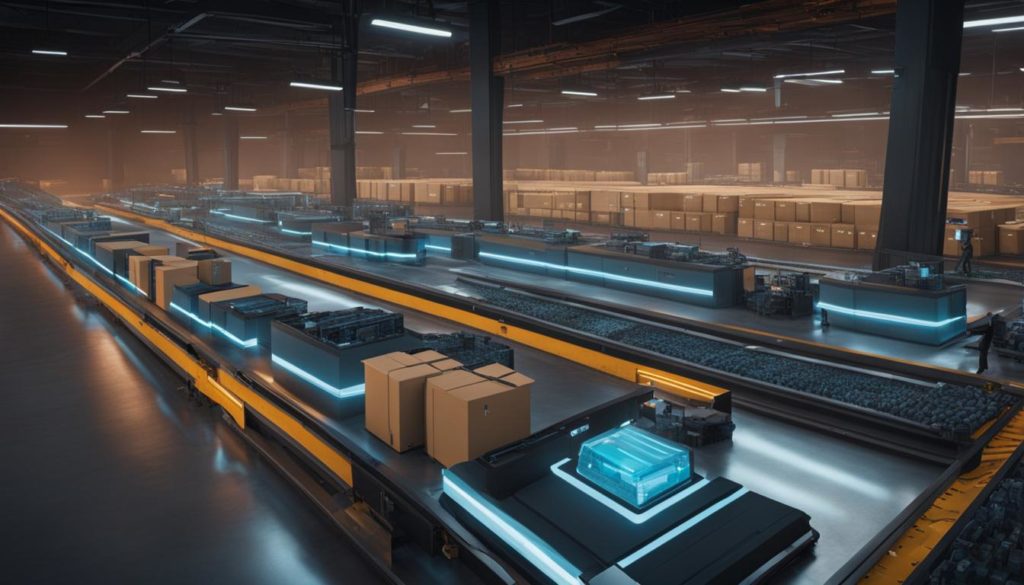Artificial intelligence (AI) is revolutionizing the supply chain industry, offering new opportunities for sustainability and risk management. By leveraging AI technologies, businesses can optimize their supply chains, reduce environmental impact, and proactively manage risks, ensuring long-term success in a dynamic business landscape.
Key Takeaways:
- AI brings innovative solutions to enhance sustainability in the supply chain.
- AI enables efficient route planning, sustainable supplier selection, and energy management.
- AI plays a crucial role in risk management, providing real-time insights and end-to-end visibility.
- AI helps businesses minimize risks, track inventory levels, and enhance quality control.
- AI’s impact on supply chain management is still evolving, offering greater potential for sustainability and risk mitigation.
Enhancing Sustainability with AI in Supply Chain Management
Artificial intelligence (AI) is revolutionizing supply chain management, offering innovative solutions to enhance sustainability and drive efficient operations. By integrating AI technologies, businesses can optimize their supply chains, minimize waste, reduce carbon footprint, and make more sustainable decisions. AI-powered demand forecasting and inventory optimization enable organizations to optimize inventory levels, minimize waste, and improve efficiency.
Efficient route planning is another application of AI that contributes to sustainability in supply chain management. By analyzing various parameters such as traffic patterns and delivery locations, AI algorithms can determine the most efficient transportation routes, reducing fuel consumption and carbon emissions. This not only benefits the environment but also improves operational efficiency and cost-effectiveness.
In addition to optimizing operations, AI enables sustainable supplier selection. AI algorithms can evaluate supplier performance based on various sustainability criteria, such as environmental certifications, ethical practices, and social responsibility. This ensures that businesses partner with suppliers who prioritize sustainability, further enhancing the overall sustainability of the supply chain.
Overall, the integration of AI in supply chain management offers significant opportunities to enhance sustainability and ensure long-term success. By leveraging AI for demand forecasting, inventory optimization, efficient route planning, and sustainable supplier selection, businesses can reduce environmental impact, improve operational efficiency, and make more sustainable supply chain decisions.
Table: AI Applications for Supply Chain Sustainability
| AI Applications | Benefits |
|---|---|
| Demand Forecasting | Optimizes inventory levels and minimizes waste |
| Efficient Route Planning | Reduces fuel consumption and carbon footprint |
| Sustainable Supplier Selection | Promotes partnerships with environmentally conscious suppliers |
Effective Risk Management with AI in Supply Chain Operations
Artificial intelligence (AI) is revolutionizing risk management in supply chain operations, providing organizations with powerful tools to identify, assess, and mitigate risks. Through predictive analytics, AI-driven systems offer real-time insights and end-to-end visibility, enabling businesses to proactively manage potential disruptions.
One of the key benefits of AI in risk management is its ability to track inventory levels and monitor supplier performance. By analyzing vast amounts of data, AI algorithms can detect patterns and anomalies, helping organizations optimize their inventory management and ensure the availability of critical supplies. This not only enhances operational efficiency but also minimizes the risk of stockouts or overstocking.
Additionally, AI enables organizations to enhance quality control and product traceability. By leveraging AI technologies, businesses can monitor production processes in real-time, detect quality issues, and take corrective actions promptly. This ensures that products meet the required standards and reduces the risk of recalls or customer dissatisfaction.
Real-time Risk Monitoring and Crisis Response
A key advantage of AI in risk management is its ability to provide real-time risk monitoring and enable swift crisis response. AI algorithms can continuously analyze data from various sources, such as weather conditions, transportation networks, and supplier performance, to identify potential risks and trigger alerts. This enables organizations to take immediate actions to prevent or mitigate the impact of disruptions.
Furthermore, AI systems can simulate different scenarios and develop contingency plans to address potential risks. By running simulations based on multiple variables, AI can help organizations identify the most effective risk mitigation strategies and minimize the impact of unforeseen events. This proactive approach to risk management enhances operational resilience and enables organizations to maintain business continuity even in challenging situations.
Overall, AI-driven risk management solutions offer businesses a comprehensive and proactive approach to risk mitigation in supply chain operations. With their capabilities to predict and prevent disruptions, monitor inventory levels, and enable crisis response and scenario planning, AI technologies are playing a crucial role in ensuring the sustainability and success of supply chain operations.
The Future of AI in Supply Chain Management

As the supply chain industry continues to evolve, the role of artificial intelligence (AI) in managing risks and enhancing sustainability is becoming increasingly vital. AI-powered solutions have already proven their effectiveness in optimizing supply chain operations and reducing environmental impact. Looking ahead, the future of AI in supply chain management holds immense potential for further advancements and positive outcomes.
AI-based supply chain risk management for sustainability is one of the key areas where AI is expected to make significant contributions. By harnessing the power of AI-driven supply chain risk assessment, organizations can proactively identify potential risks, analyze sustainable risk factors, and develop strategies to mitigate them. AI solutions for supply chain sustainability offer real-time insights and end-to-end visibility, enabling businesses to make informed decisions that align with their sustainability goals.
Another area where AI is set to shape the future of supply chain management is in sustainable planning. AI-powered algorithms can optimize inventory levels, minimize waste, and create efficient routes, leading to reduced carbon footprints and increased operational efficiency. With AI solutions for supply chain sustainability, organizations can prioritize sustainable supplier selection, energy management, and waste reduction, ensuring they operate in an environmentally conscious and socially responsible manner.
The Benefits of AI in Supply Chain Management:
- Enhanced risk management through predictive analytics and real-time insights
- Improved sustainability by optimizing inventory levels, reducing waste, and minimizing environmental impact
- Increased operational efficiency through AI-driven routing and planning
- Proactive crisis response and scenario planning to maintain operational resilience
- End-to-end visibility and traceability for effective quality control and supplier performance monitoring
The future of AI in supply chain management is promising, with ongoing advancements in technology and its applications. Continued integration of AI solutions will empower businesses to optimize their supply chains, reduce environmental impact, and enhance risk management practices. By embracing AI-powered risk management and sustainable planning, organizations can position themselves for long-term success and support the development of a more sustainable and resilient supply chain ecosystem.
Case Studies: AI in Supply Chain Sustainability and Risk Management
Several companies have successfully implemented AI-powered solutions in their supply chains to enhance sustainability and risk management. These case studies demonstrate the effectiveness of AI in driving sustainable practices and mitigating risks in supply chain operations.
Amazon: Optimizing Transportation and Reducing Environmental Impact
Amazon, a leader in e-commerce and logistics, leverages AI to optimize its transportation network and reduce fuel consumption. By analyzing vast amounts of data, AI algorithms can identify the most efficient routes, reducing delivery times and fuel consumption. This not only improves operational efficiency but also minimizes the environmental impact of Amazon’s supply chain. By using AI, Amazon demonstrates its commitment to sustainable practices while delivering goods to customers worldwide.
Walmart: Energy Efficiency Through AI Monitoring
Walmart, a multinational retail corporation, utilizes AI technology to improve energy efficiency in its warehouses. Through AI monitoring systems, Walmart can track and analyze energy consumption patterns, identifying areas for optimization and implementing energy-saving measures. By reducing energy waste, Walmart contributes to a more sustainable supply chain while also reducing operational costs. AI-powered energy management is a key aspect of Walmart’s commitment to environmental sustainability.
Nestlé: Waste Tracking and Management with AI
Nestlé, a leading food and beverage company, incorporates AI technology to track and manage waste in its supply chain. AI algorithms monitor waste levels and provide real-time insights to optimize waste management processes. By identifying areas of waste and implementing proactive measures, Nestlé reduces its environmental impact while promoting sustainable practices. Through AI-powered waste tracking and management, Nestlé demonstrates its dedication to sustainability and responsible resource management.
| Company | AI Application | Sustainability Benefits |
|---|---|---|
| Amazon | Optimizing transportation network | Reduced fuel consumption, improved delivery efficiency |
| Walmart | AI monitoring for energy efficiency | Reduced energy waste, lower operational costs |
| Nestlé | AI-based waste tracking and management | Optimized waste management, reduced environmental impact |
UPS: Predictive Analytics for Disruption Prevention
UPS, a global package delivery and supply chain management company, harnesses the power of AI to predict and prevent disruptions. By analyzing various data sources, AI algorithms can identify potential issues and enable proactive measures to maintain smooth operations. This helps UPS minimize supply chain disruptions, improve customer satisfaction, and reduce costs associated with disruptions. UPS’s use of AI exemplifies how technology can enhance risk management and ensure supply chain resilience.
These case studies highlight the tangible benefits of integrating AI into supply chain management to drive sustainability and mitigate risks. With AI-powered solutions, companies can optimize their supply chains, reduce environmental impact, and enhance operational resilience. As technology continues to advance, the role of AI in supply chain sustainability and risk management is expected to evolve, offering further opportunities for businesses to achieve sustainable success.
Conclusion
The integration of AI into supply chain management has the potential to revolutionize sustainability efforts and risk management practices. By leveraging AI technologies, businesses can optimize their supply chains, reduce environmental impact, proactively manage risks, and ensure operational resilience.
AI-powered risk management enables organizations to assess and analyze sustainable risks, while AI-driven supply chain risk assessment provides real-time insights and end-to-end visibility. This allows businesses to identify and mitigate potential risks, track inventory levels, monitor supplier performance, and enhance quality control and product traceability.
Furthermore, AI solutions for supply chain sustainability offer innovative ways to enhance environmental responsibility. Through AI-based demand forecasting and inventory optimization, businesses can minimize waste, reduce carbon footprint, and make more sustainable supply chain decisions. AI also plays a crucial role in crisis response and scenario planning, simulating different situations and developing contingency plans to minimize risks and maintain operational resilience.
As AI technology continues to advance, the possibilities for AI in supply chain management are bound to increase. Organizations committed to sustainability and risk mitigation can leverage AI-enabled solutions to gain a competitive advantage and ensure long-term success in a dynamic business landscape.
Source Links
- https://www.mckinsey.com/industries/metals-and-mining/our-insights/succeeding-in-the-ai-supply-chain-revolution
- https://www.linkedin.com/pulse/harnessing-power-ai-transforming-supply-chain-risk-suryawanshi
- https://www.mdpi.com/2071-1050/15/20/15088
- Customer Engagement and Loyalty: Innovating the Future of Saudi Arabia’s Dedicated Cargo Airline - December 23, 2024
- Regulatory and Compliance: Pioneering the Future of Saudi Arabia’s Dedicated Cargo Airline - December 21, 2024
- Financial Strategies: Fueling the Growth of Saudi Arabia’s Dedicated Cargo Airline - December 20, 2024






